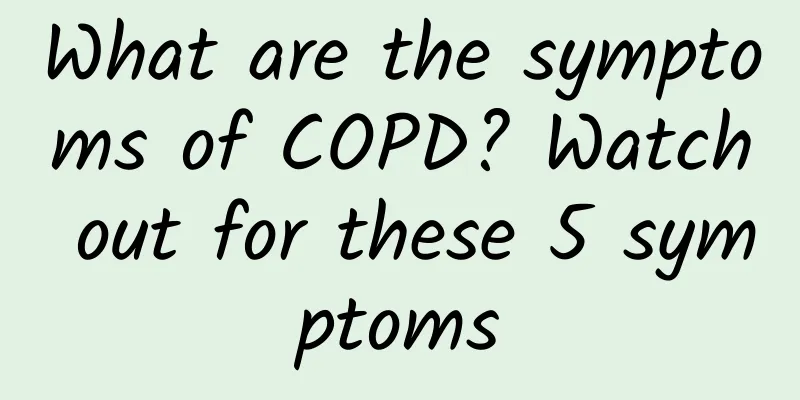What are the symptoms of COPD? Watch out for these 5 symptoms

|
Chronic cough, shortness of breath or difficulty breathing, frequent wheezing and chest tightness, and frequent coughing up phlegm are all symptoms of COPD. When these symptoms appear, you should undergo relevant examinations as soon as possible. 1. Chronic cough: The first symptom is an intermittent cough, which is more severe in the morning but not significant at night. In a few cases, cough is not accompanied by sputum. There are also some cases with obvious airflow limitation but no cough symptoms. 2. Shortness of breath or difficulty breathing: The hallmark symptom only occurs during exertion in the early stages, and then gradually worsens, so that shortness of breath is felt during daily activities or even during rest. 3. Wheezing and chest tightness: Some patients, especially those with severe conditions, experience wheezing; chest tightness usually occurs after exertion and is related to labored breathing and isovolumetric contraction of the intercostal muscles. 4. Coughing up phlegm: After coughing, people usually cough up a small amount of mucous phlegm, and some patients have more in the early morning. When combined with infection, the amount of phlegm increases, and there is often purulent phlegm. 5. Systemic symptoms: During the clinical course of the disease, especially in more serious patients, systemic symptoms may occur, such as weight loss, loss of appetite, peripheral muscle atrophy and dysfunction, depression and (or) anxiety, etc. When combined with infection, coughing up blood or sputum may occur. Pulmonary function testing is the gold standard for diagnosing metastatic COPD. It mainly measures the one-second ventilation rate, which is to take a deep breath, then blow out the gas as fast as you feel, and see how much of the gas exhaled in the first second accounts for the total exhaled volume. For patients with COPD, the ventilation rate in one second is less than 70%; the total expiratory volume is less than 80% of normal patients of the same age. |
<<: How to treat hemorrhoids with saltpeter and Sophora japonica
>>: What are the symptoms of ureterocele? Do you urinate normally?
Recommend
How to eliminate foot edema
Foot edema is quite common in our daily life. The...
What causes tinea corporis? Disease factors are the most common
Tinea corporis is a common skin disease. Sometime...
Yang Fire and Yin Fire
Yang fire and Yin fire are actually a term in tra...
How to use potato peels to treat gray hair
Many people don’t know that potato peels can actu...
The efficacy and function of sheep whip
Sheep penis can strengthen the body and enhance o...
There are many things to pay attention to when massaging pregnant women. If you touch this area, you will have a miscarriage.
Have you heard of the rhyme "Pregnant women ...
What to do if you have bloating? Relief of gas and bloating
If you want to effectively relieve the problem of...
What is the reason for feeling weak and exhausted?
We may all feel weak and tired occasionally. Weak...
What are the symptoms of bipolar disorder?
Bipolar disorder is also a relatively common diso...
Can I drink black wolfberry every day?
As sub-health conditions become more and more com...
Learn about the symptoms and treatment of night sweats
Night sweats are a disease in traditional Chinese...
What to do if your roommate snores
Some small problems are inevitable in collective ...
What is the good Chinese medicine remedy for spontaneous sweating and night sweats?
It is normal for people to sweat when it is hot. ...
Can I do moxibustion after cupping?
Whether it is cupping or moxibustion, both have m...
What is diaper dermatitis? What causes diaper dermatitis?
Diapers can cause neonatal diseases, the most com...









